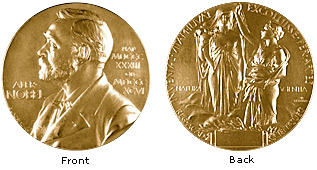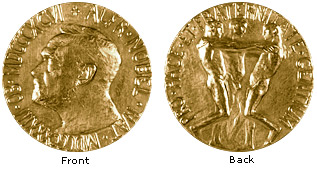Nobel Prize
Updated October 21, 2010Every year since 1901, the Nobel Prize has been awarded for achievements in physics, chemistry, physiology or medicine, literature and for peace. The Nobel Prize is an international award administered by the Nobel Foundation in Stockholm, Sweden. In 1968, Sveriges Riksbank established The Sveriges Riksbank Prize in Economic Sciences in Memory of Alfred Nobel, founder of the Nobel Prize. Each prize consists of a medal, a personal diploma, and a cash award.
 |
 |
 |
 |
 |
Alfred Nobel (1833-1896) was born in Stockholm, Sweden, on October 21, 1833. His family was descended from Olof Rudbeck, the best-known technical genius in Sweden in the 17th century, an era in which Sweden was a great power in northern Europe. Nobel was fluent in several languages, and wrote poetry and drama. Nobel was also very interested in social and peace-related issues, and held views that were considered radical during his time.
On November 27, 1895, Alfred Nobel signed his last will in Paris. When it was opened and read after his death, the will caused a lot of controversy both in Sweden and internationally, as Nobel had left much of his wealth for the establishment of a prize! His family opposed the establishment of the Nobel Prize, and the prize awarders he named refused to do what he had requested in his will. It was five years before the first Nobel Prize could be awarded in 1901.
The Nobel Prize Award Ceremonies and Banquets take place in Stockholm (for the Nobel Prizes in Physics, Chemistry, Physiology or Medicine, Literature and The Sveriges Riksbank Prize in Economic Sciences in Memory of Alfred Nobel) and in Oslo (for the Nobel Peace Prize) on December 10 every year, the anniversary of Alfred Nobel's death.
205 names were submitted for the 2009 Nobel Peace Prize, 33 of which are organizations. The Nobel Committees in Physics, Chemistry, Physiology or Medicine, Literature and the Prize Committee for Economics each usually receives 250-300 names every year, but this is the highest number of nominations for the Nobel Peace Prize ever. The last record was in 2005 when the Committee received 199 nominations. The names of the nominees cannot be revealed until 50 years later.
It is not possible to nominate someone in a posthumous Nobel Prize. From 1974, the Statutes of the Nobel Foundation have stipulated that a Prize cannot be awarded posthumously, unless death has occurred after the announcement of the Nobel Prize. This happened in 1996 when William Vickrey died only a few days after the announcement of the Prize in Economics.
Before 1974, the Nobel Prize has only been awarded posthumously twice: to Dag Hammarskjöld (Nobel Peace Prize 1961) and Erik Axel Karlfeldt (Nobel Prize in Literature 1931)
Information taken from: nobelprize.orgOther Links of Interest:
- Nobel Peace Center
- List of all Nobel Laureates
- Nobel Will (excerpt) | (full)
- Nobel Peace Prize History
- Nobel Online Educational Games
